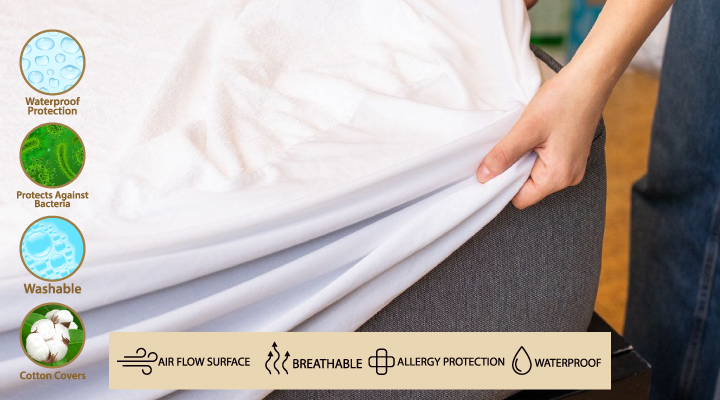A mattress protector is an important non-debatable need for people who are worried about protecting their mattress against spills, dust bugs, allergens that can cause stains, and other signs of deterioration. Urine accidents, liquid spills, perspiration cause deep stains and cause damage to your mattress; in this case, mattress protectors made up of vinyl that act as a barrier against these accidents.
But the most common question asked about mattress protectors is can a mattress protector make you sweat. The answer is yes; many customers report increased night sweats from this protective membrane that meat to keep your mattress dry at all costs. In this post, we will discuss factors and some tricks to get rid of sweat. So read on to learn;
Why do mattress protectors make you sweat?
Mattress protectors make you sweat because the barrier integrated into the protector seized the free flow of air that can make little to no temperature in the sleeper’s body. When the body gets warm at midnight, the absence of an air pathway from the sheet material to the bedding may mean an unendurably hot sleeping surface. It also increases the temperature of those who usually enjoy natural cool sleep. For any individual who has consistently battled with sweaty nights even before adding a sleeping pad cushion along with everything else, the situation may only get worse.
When a conscious expansion to the sleeping environment causes you to awaken sweat-doused, that can be a significant issue. Although the mattress protectors offer many benefits and services, it also increases the chance of sweating. If you suffer from night sweats, then learn which type of person you are.
Which type of person are you?
It is obvious that mattress protectors can contribute to night sweats, but some sweat more than others. If someone falls under these categories, then a mattress protector is not a good option for them.
Hot sleepers
Body temperature varies among people and automatically cools down before sleep. But there are also some exceptions; there are some people whose body temperature remains abnormally high throughout the night even after drifting off. Natural hot sleepers may feel hot even in conditions that may be cool for other people. This can prompt plentiful perspiring when others are not displaying any such signs. Hot sleeping is a genetic condition for which no clinical treatment has been found.
If you are continually sweating even in the blasting air condition, a waterproof mattress protector may not be the best option.
Menopause women
Night sweats and hot flashes are the most common issues of menopause women. Those women who have enjoyed the cool sleep all their lives may go through the discomfort after reaching menopause.
The night sweats and hot glimmers are brought about by the consistent changes in the level of estrogen, progesterone, and different hormones. This normally represses the body’s common capacity to manage its temperature leading to those intolerable degrees of inconvenience.
The last thing a menopausal lady with extreme hot blazes may require is to go to bed on a waterproof bedding protector since it can affect the quality of her rest significantly.
Diabetes
Sweaty nights are also typical in diabetic patients, even in freezing cold when others are freezing. These night sweats happen due to plunging glucose levels typical during the night. The sudden massive drop in blood glucose levels may prompt actual signs, for example, cerebral pains and severe night sweats. In this situation, mattress protectors are not the best solution.
Medication
If you suffer from cancer or undergo treatments for other life-threatening therapies, these drugs cause sweating at night.
Tips you should try to stop sweat at night.
- Lower down the temperature of the room
- Wear natural fiber
- Use wool blankets and comforter.

